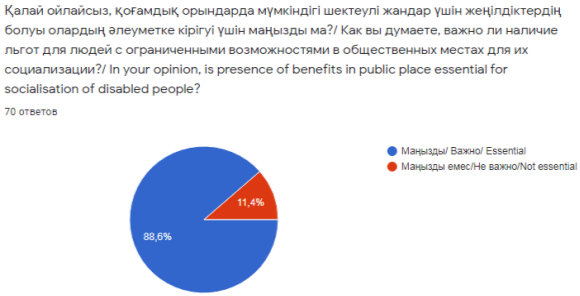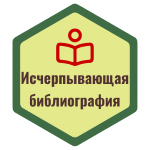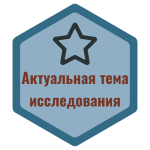Over 1,000,000,000 of people in the world live with some disabilities and 674200 of them live in Kazakhstan where the overall population is only 18 million people (Abylkassymova, 2018).
Disabled people’s willpower, asset personal traits and life experience inspires me. So, I wish to investigate obstacles in socialization that disabled people face in their daily life, somehow alleviate disabled people’s socialization and make their life in society more convenient.
One of the sustainable development goals is to promote peaceful and inclusive societies, provide access to justice for all, hence supporting vulnerable groups (e.g disabled people) is essential for each government. So, the UN Convention on the Rights of Persons with Disabilities which was ratified in 2015 in Kazakhstan is an important step to improve the lives of the country’s disabled population. All rights of people with disorders are mentioned in this international Convention as well as in the Law of the Republic of Kazakhstan.
Accessibility which stands for creating a barrier-free environment for disabled people is an essential aspect affecting the socialization. The University of Washington’s Taskar Center for Accessible Technology has invented a map-based app allowing disabled pedestrians to enter a destination and receive accessible routes. Singapore may not historically be known for inclusive practices, but has won praise from the UN for its “user-friendly built environment”. Chester in north-west England became the first British city to win the European commission’s Access City award in 2017. (www.theguardian.com)
According to the Law of the Republic of Kazakhstan (2005, article 25) residential, public and industrial buildings should be constructed in accordance with national standards; special parking facilities and traffic lights with synchronous audio alarms should be arranged. The special certification has been conducted on 51000 objects but there are at least 32600 social instances identified as needing the certification. (Madina Abylkassymova, 2018).
The Future without Barriers program work on helping disabled citizens to find permanent employment, eliminating physical barriers, raising public awareness of and positive attitudes toward people with disabilities and developing inclusive education. “Invataxi” work daily to alleviate transport for people with disabilities. Moreover, nowadays disabled people are invited to different conferences, events and projects in order to increase awareness of society. The annual international Zhan Shuak Award for people with disabilities who are playing an active role in society was established in 2008 (24.kz). There are several programs with participation of disabled people on main governmental TV channels as “Eki zhuldyz” and “Zhan Zhyluy”.
Inclusive education is also significant for socialization of disabled people. Currently, only 27 % of children with disabilities study in mainstream schools and only 1 % in higher education but this rate is planned to increase. This low rate can negatively affect the socialization of disabled people.
The main purpose of this research is to investigate the attitude of disabled people to socialise in Kazakhstan. I would like to find out more about social perspectives and efficiency of services that influence socialisation of disordered people Thus, the following questions rise:
− How do disabled people evaluate their opportunity to socialize in Kazakhstan?
− What is the level of society’s tolerance in Kazakhstan?
− What governmental and nongovernmental special services satisfy the needs of disabled people in Kazakhstan?
My hypothesis is that disabled population of Kazakhstan is not satisfied with aspects mentioned in research questions. Investigation can suggest the local government to improve opportunities. Moreover, I am inclined to believe that non-active disabled people will endeavour to interact with public, relying on the experience of active disabled members of society.
Both qualitative and quantitative method tools were used to obtain relevant information about socialization of disabled people. Using of triangulation method for data collection: survey, interview and social experiment helped to avoid potential biases and to gather valid information for all three research questions.
Analyzing the data obtained in primary research, results of the research tools are as following:
Data from the survey related to the question: “What is the level of society’s tolerance in Kazakhstan?” shows that, generally, the social tolerance is at average to high level, as can be seen in Table1: the majority of respondents (38.6 %) chose the option “moderate” and 31.4 % indicated high tolerance. Even though nobody indicated “absolutely high” tolerance, one interviewee described society as very tolerant. However the indicative “average” does not provide enough information, therefore other questions and methods were considered.
Table 1
Rate of the social tolerance towards disabled people in Kazakhstan”
|
Option |
Number of respondents |
Percentage |
|
Absolutely low |
10 |
14.3 |
|
Low |
11 |
15.7 |
|
Moderate |
27 |
38.6 |
|
High |
22 |
31.4 |
|
Absolutely high |
0 |
0 |
Relating to the question “What governmental and nongovernmental special services satisfy the needs of disabled people?” The majority of respondents (89 %) think that benefits in public places are essential for socialization of disabled people (Fig. 1). However, according to the Table 2, respondents assess availability of special services mainly as moderate (33/70) and absolutely low (16/70).

Fig. 1. Importance of benefits in public places
Table 2
Rate of the availability of special services for disabled people
|
Option |
Number of respondents |
Percentage |
|
Absolutely low |
16 |
22.9 |
|
Low |
8 |
11.4 |
|
Moderate |
33 |
47.1 |
|
High |
13 |
18.6 |
|
Absolutely high |
0 |
0 |
Services as Invataxi (60 %), free notary (61.4 %) and cinema discounts (37.1 %) are in top 3 of the most commonly used services.
Answers related to the question: “How do disabled people evaluate their opportunity to socialize in Kazakhstan?” There is a correlation between 3 research tools responses. They suggest that opportunities for socialisation are better in large cities in comparison with smaller towns. Primary research reveals that disabled people are not fully satisfied with opportunities for their socialization.
According to interview responses, accessibility is one of the major aspects influencing socialisation: “Socialization cannot be even discussed when there are problems with accessibility and disabled person cannot at least go out”. Analyzing the barrier — free environment aspect, the median indicative is “low” (Table 3).
Table 3
Rate of the barrier-free environment for disabled people
|
Option |
Number of respondents |
Percentage |
|
Absolutely low |
20 |
28.6 |
|
Low |
22 |
31.4 |
|
Moderate |
24 |
34.3 |
|
High |
4 |
5.7 |
|
Absolutely high |
0 |
0 |
The research project’s purpose is to investigate the attitude of disabled people to socialise in Kazakhstan. The hypothesis I made at the beginning according to own experience states that the opportunities for socialisation in Kazakhstan are unsatisfactory. My hypothesis is mostly supported by both primary and secondary researches and the following conclusions have been drawn:
− How do disabled people evaluate their opportunity to socialize in Kazakhstan?
Accordint to the results of primary research, returning of people with disabilities to an active social life is problematic despite the secondary research data which draws a better picture, but 4/6 inteviewees shared that gowvernment is working on resolving the issue.
− What is the level of social tolerance towards disabled people in Kazakhstan?
Overall primary research proves that the level of social tolerance is higher than moderate. However, the indicative “moderate” is subjective, so the survey questions considered various perspectives and provide quantitative data to get more valid result. Unexpectedly my personal bias that Kazakhstani society is not tolerant towards disabled people was contradicted after the primary research.
− What governmental & nongovernmental special services satisfy needs of disabled people in Kazakhstan?
Results show that disabled people assess the availability of special services at level lower than moderate because 42 % and 23 % of respondents answered “moderate” and “absolutely low” respectively. This was surprizing because the context part shows that the government has launched projects “Future without barriers” in order to support disabled people (24.kz). Answering the research question directly, the survey results show that Invataxi (60 %), free notary (61.4 %) and cinema discounts (37.1 %) are in the list of the most required services.
The research allows to make general conclusion that disabled people has more negative attitude to socialize in Kazakhsatn rather that positive but respondents suggest that government is taking measures to enhance the opportunities. However, the data obtained does not allow to generalise the conclusion to the whole disabled population of Kazakhstan.
References:
- Brynuk, K. (2018). В Астане прошла 11 церемония вручения Международной общественной премии «ЖАН ШУАҚ». Astanatv.kz. https://astanatv.kz/ru/news/44721/.
- Kazakhstan develops new national plan for people with disabilities — The Astana Times. The Astana Times. (October, 2018). https://astanatimes.com/2018/10/kazakhstan-develops-new-national-plan-for-people-with-disabilities/.
- Salman, S. (February, 2018). What would a truly disabled-accessible city look like?. the Guardian. https://www.theguardian.com/cities/2018/feb/14/what-disability-accessible-city-look-like.
- Stewart, P., & Rittman, M. (March, 2019). Interview: Children with Disabilities in Kazakhstan Are Missing Out. Human Rights Watch. https://www.hrw.org/news/2019/03/14/interview-children-disabilities-kazakhstan-are-missing-out.
- Witte, M. Kazakhstan Making Strides in Disability Access, Acceptance — Edge: Kazakhstan. Edge: Kazakhstan. https://www.edgekz.com/kazakhstan-making-strides-in-disability-access-acceptance/.
- Какая помощь оказывается людям с ограниченными возможностями в столице. Inform.kz. (October, 2019). https://www.inform.kz/ru/kakaya-pomosch-okazyvaetsya-lyudyam-s-ogranichennymi-vozmozhnostyami-v-stolice_a3574769.












